

Hang on a moment lads. Moodle. Moodle (acronym for Modular Object-Oriented Dynamic Learning Environment) is a free software e-learning platform, also known as a Learning Management System, or Virtual Learning Environment (VLE).
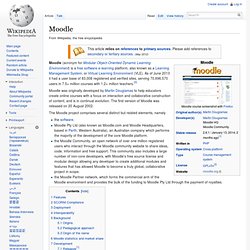
As of June 2013[update] it had a user base of 83,008 registered and verified sites, serving 70,696,570 users in 7.5+ million courses with 1.2+ million teachers.[3] Moodle was originally developed by Martin Dougiamas to help educators create online courses with a focus on interaction and collaborative construction of content, and is in continual evolution. The first version of Moodle was released on 20 August 2002. The Moodle project comprises several distinct but related elements, namely Features[edit] Moodle has several features considered typical of an e-learning platform, plus some original innovations (like its filtering system).[4] Moodle is a learning management system (LMS).
Journal of Virtual Worlds Research. Online research methods. Online research methods (ORMs) are ways in which researchers can collect data via the internet.
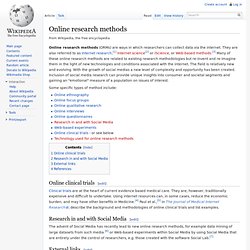
Glyndebourne. DLWP, The De La Warr Pavilion, Bexhill, East Sussex. A Modernist icon for the contemporary arts and live music on the seafront in Bexhill. Social capital. In sociology, social capital is the expected collective or economic benefits derived from the preferential treatment and cooperation between individuals and groups.
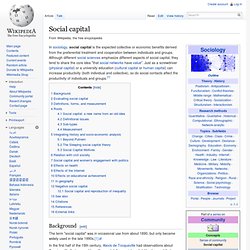
Although different social sciences emphasize different aspects of social capital, they tend to share the core idea "that social networks have value". Just as a screwdriver (physical capital) or a university education (cultural capital or human capital) can increase productivity (both individual and collective), so do social contacts affect the productivity of individuals and groups.[1] Background[edit] The term "social capital" was in occasional use from about 1890, but only became widely used in the late 1990s.[1] In the first half of the 19th century, Alexis de Tocqueville had observations about American life that seemed to outline and define social capital.
L. Getting Connected: Can Social Capital be Virtual? Megan Alessandrini PhD, School of Government, University of Tasmanaia, private bag 22, Hobart TAS 7001 Australia.
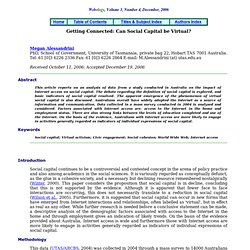
Tel: 61 [0]3 6226 2336 Fax: 61 [0]3 6226 2864 E-mail: M.Alessandrini (at) utas.edu.au Received October 11, 2006; Accepted December 19, 2006 Abstract This article reports on an analysis of data from a study conducted in Australia on the impact of Internet access on social capital. Parlaying Value. Capital in and Beyond Virtual Worlds Abstract Recent scholarship has made it clear that people within synthetic worlds (otherwise known as virtual worlds or MMORPGs) produce commodities and currencies with market value, whereas other work has established the increasing importance of social networks within and between worlds and across the boundary that appears to separate them from the rest of users' lives.
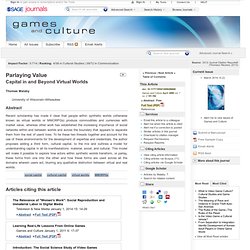
To tie these two threads together and account for the use of these environments for the development of expertise and credentials, the author proposes adding a third form, cultural capital, to the mix and outlines a model for understanding capital in all its manifestations: material, social, and cultural. This model will make it possible to explore how actors within synthetic worlds transform, or parlay, these forms from one into the other and how these forms are used across all the domains wherein users act, blurring any qualitative distinction between virtual and real worlds. Eddie Izzard on the roof of the De La Warr Pavilion 8/7/2011. Eddie Izzard and Richard Wilson Discuss "Hang On A Minute Lads..." An artists' home and garden. Arts research: from spin-out to sandbox. The starting point for the process formerly known as 'knowledge transfer' imagines some white coated scientist or engineer beavering away in a lab before stumbling on something that might actually be useful to the wider world.
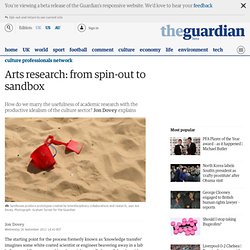
This stereotype hinges on the idea of the 'spin-out company', which takes intellectual property developed through academic research, then puts it through a university-supported business development process, often in an incubator-like environment. Convergence. Skip to Content By joining this group you will also get the opportunity to subscribe to its activity.
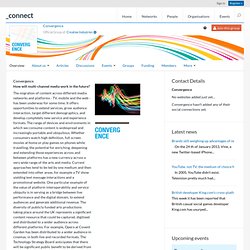
Join this group Convergence Official Group of Creative Industries. Keynote: How Social Should Your Culture Be? Do you want to take Survey - 'Survey Title'?
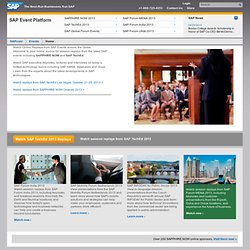
Yes No Watch Online Replays from SAP Events around the Globe Welcome to your online source for session replays from the latest SAP events including SAPPHIRE NOW and SAP TechEd. Watch SAP executive keynotes, lectures and interviews on today’s hottest technology topics including SAP HANA, databases and cloud. Learn from the experts about the latest developments in SAP technologies. Watch replays from SAP TechEd Las Vegas, October 21-25, 2013 > Watch replays from SAPPHIRE NOW Orlando 2013 >
Virtual Human Toolkit. 2009-present Project Leader: Arno Hartholt Download a PDF overview.
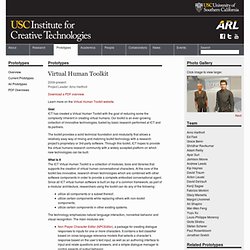
Learn more on the Virtual Human Toolkit website. Goal ICT has created a Virtual Human Toolkit with the goal of reducing some the complexity inherent in creating virtual humans. Our toolkit is an ever-growing collection of innovative technologies, fueled by basic research performed at ICT and its partners. Creative and Cultural Economy. DCRC - Digital Cultures Research Centre. The Digital Cultures Research Centre (DCRC) is a space for research into the practices and socio-cultural meanings of emerging media.
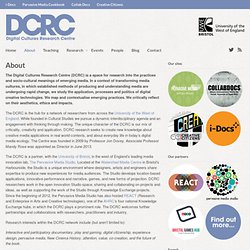
In a context of transforming media cultures, in which established methods of producing and understanding media are undergoing rapid change, we study the application, processes and politics of digital creative technologies. We map and contextualise emerging practices. We critically reflect on their aesthetics, ethics and impacts. The DCRC is the hub for a network of researchers from across the University of the West of England. While founded in Cultural Studies we pursue a dynamic interdisciplinary agenda and an engagement with thinking through making. The DCRC is a partner, with the University of Bristol, in the west of England’s leading media innovation lab, The Pervasive Media Studio. Research interests within the DCRC network include (but aren’t limited to): The Great Exhibition 2012. REACT. The New Rules of Innovation. On September 28th 2012, REACT hosted its first showcase event around the theme of Heritage at Watershed.
We premiered films about all six commissions from the Heritage Sandbox, discussed their journeys from wild ideas into products, experiences and services, and enjoyed a keynote from cultural commentator, Charles Leadbeater.